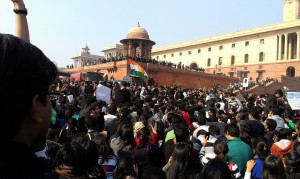‘it is sometimes right’: indian politicians deny women’s rights to a world free of rape
Two girls hanging from a tree in India: gang raped, murdered. On the internet, images of the teenaged cousins from Uttar Pradesh in the country’s north have gone viral in recent weeks. The images, which contravene India’s media laws about identifying the victims of rape, have caused international outrage. But just as concerning is the attitude of numerous Indian politicians, remarking about the nation’s attempts to curb rape culture as futile.
Prompted by this case, one parliament member from the country’s ruling Bharatiya Janata Party is under fire for expressing his belief that rape is sometimes justified. ‘It is a social crime which depends on the man and the woman,’ Madhya Pradesh Home Minister, Babulal Gaur said, in spite of many protests in the country calling to end rape culture. ‘It is sometimes right and sometimes wrong.’ Putting the onus on women to take self-defence classes, the minister said ‘action can be taken only after the act is done’. This is just one of many sentiments by Indian politicians promoting reactive policy to rape culture, or worse: promoting rape.
New Delhi-based journalist Neha Dixit highlights a number of issues underlying the rape crisis and apathy to it in her country. India’s engrained caste system sees the ‘untouchable’ land-owning class have distinct power over the rural poor. This is what hindered police investigations into the rape of the two Uttar Pradesh cousins and lead to their brutal deaths as they, survivors, wandered out into their village’s fields. Their attackers are the ‘untouchables’, landowners and police themselves, who have since been arrested.
Dixit says the nation’s patriarchal culture sees ‘the bodies of women [as] the repositories of culture and family “honour”’. Public spaces are male not only by default, but by enforcement as men who dominate the streets harass women to lecture them on where they supposedly belong. Furthermore, the recently elected BJP government wants to end sex education – which could provide a wealth of information on consent – based on its Western origins and breaking of traditional morals.
All these factors and more combine to create a dangerous environment for women wanting to simply go about their lives. When Indian women exercise the rights we have in Australia, they are subjected to violence such as acid attacks, bashings and – as we look at here – sexual assault. At the time of writing, numerous assaults have garnered media attention both locally in India and internationally, as has a ‘social experiment’ of a staged rape in a van posted on YouTube to highlight the blasé attitude in the country towards women’s rights.
Women in India, the world’s largest democracy, have very little representation in both levels of its parliament. Women make up just 11 per cent of the 543 seats in the Lok Sabha (lower house) and almost 12 per cent of the 243 seats in its upper house, the Rajya Sabha. To compare, Australian women make up 26 per cent of the federal House of Representatives and 41 per cent of the Senate. The nation’s law enforcers are predominantly male and its judicial process sees only 26 per cent of rape cases result in conviction.
In light of the recent violence in Uttar Pradesh and this lack of representation in the executive, judiciary and enforcers, online campaigns are being enacted to lobby the Indian Sabhas. A petition on global activism platform Avaaz has – at the time of writing – reached more than 1.6 million signatures from around the world in support of their Womanifesto for India. But with a national population of 1.2 billion and ingrained misogyny in parliament, it remains to be seen whether such a significant number of voices will have any influence on government attitudes in the sovereign state.


